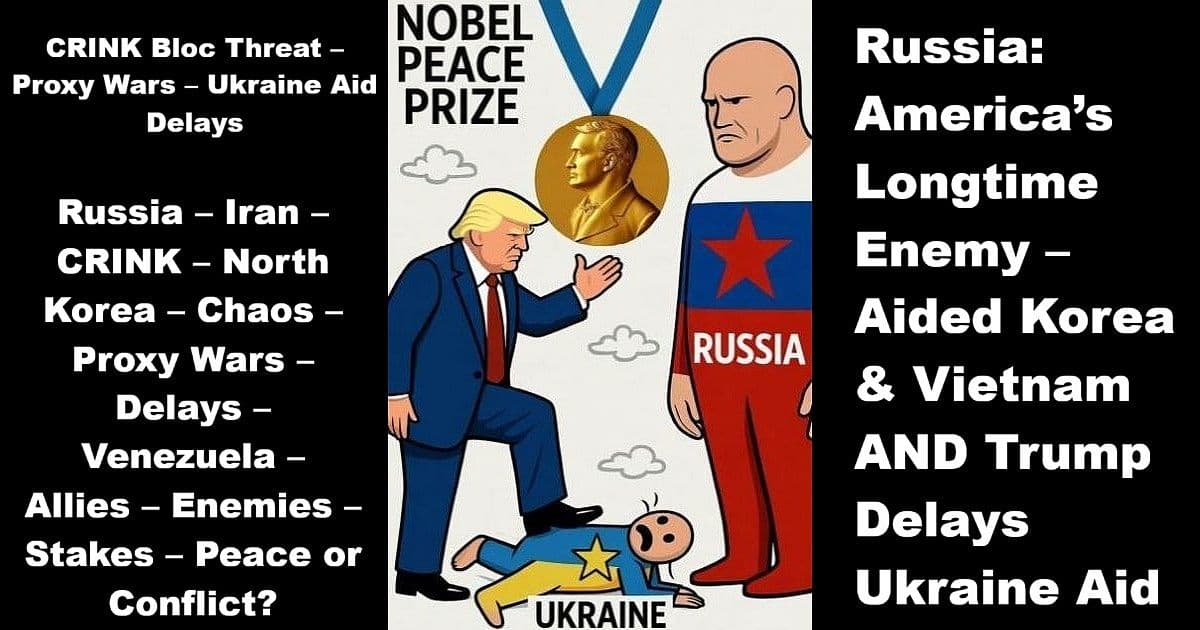
Russia has spent decades as America’s persistent adversary—arming North Korea and Vietnam against U.S. troops, forming military and strategic pacts with China and Iran, and now threatening global order alongside a hostile bloc. Yet today, as Ukraine fights for its survival, Washington hesitates; Trump delays Ukraine Aid, echoing lessons the U.S. seems doomed to repeat.
For many Americans, the cost of Russia’s antagonism is not just historical but personal: thousands of U.S. lives lost fighting forces equipped and trained by the Soviet Union in both Asia’s great proxy wars. “Ukraine Aid” should be the unambiguous line in the sand—yet policy stalling hands Russia more time, leverage, and influence, at Ukraine’s and the West’s expense.
Russia’s Legacy: Aiding America’s Enemies
The Soviet Union poured weapons, advisors, and money into North Korea during the Korean War, directly enabling the invasion of the South and fueling a bloody conflict with American and UN soldiers. Later, Vietnam received tanks, MiGs, missiles, and military doctrine from Moscow, all aimed at countering U.S. efforts and raising the cost in blood and treasure.
Every round fired at American troops by North Vietnamese or North Koreans was more likely than not stamped “USSR.” The Soviets even sent pilots and covert personnel, a reality that Americans in Vietnam came to know well. This was the Cold War: indirect combat, outsourced devastation, lessons that Washington once swore never to forget.
A New Axis: CRINK and the Ghost of Proxy Wars
Today’s Russia isn’t working alone. The CRINK bloc—China, Russia, Iran, and North Korea—represents a loosely coordinated alliance threatening the democratic world from multiple fronts. These nations finance, arm, and strategically back each other’s ambitions, leveraging every pause in western resolve.
See more on the CRINK alliance here:
Trump Delays Ukraine Aid: History Repeats
Despite these lessons, Trump has repeatedly delayed, frozen, or minimized Ukraine Aid. In moments critical for Ukraine’s defense, shipments of air defense, drones, and artillery have been cut, paused, or subjected to political wrangling. Analysts, Pentagon officials, and Ukraine’s government have warned that each day of delay risks Russia’s victory and destabilizes international security.
Why “Ukraine Aid” Matters
Ukraine Aid is more than a technical issue: it symbolizes America’s willingness to learn from past mistakes and actually stand up to its longest-running enemy. Each delay represents not just a risk to Ukraine, but a signal to China, Iran, and North Korea—all watching how the West manages crisis and commitment.
Read about the scale of U.S. assistance here:
Karmi & Sidekick: Q&A on Ukraine Aid, Russia, and Treason
Karmi: Why doesn’t Trump recognize that Russia helped get American troops killed in Korea and Vietnam—and that this is the moment to pay them back by arming Ukraine?
Sidekick: Historically, Russia (the USSR) supplied North Korea and North Vietnam with the weapons and support that led to thousands of US casualties. Many see the current Ukraine crisis as a chance to repay that legacy, though political caution and negotiation seem to outweigh the tit-for-tat desire for retribution.
And, Karmi, Russia’s support isn’t limited to old wars. Today, Moscow backs Iran as it helps arm groups like Hamas, Hezbollah, and the Houthis (Jamestown). Russia has also been a key supporter of Syria’s regime and nearly any force fighting against American allies.
Karmi: Isn’t Trump aiding America’s enemy, Russia, by stalling and blaming Ukraine, and by limiting weapons when Russia is the real threat?
Sidekick: Analysts and critics point out that delaying or limiting Ukraine Aid benefits Russia, giving it time to regroup and a greater chance to achieve its goals. Legally, this doesn’t meet the Constitution’s tough definition of treason (“aid and comfort”), but morally and politically, these actions have real consequences for US national security.
Karmi: Is this behavior close to treason? What does the Constitution actually say?
Sidekick: The Constitution strictly defines treason as “levying war against the United States, or in adhering to their enemies, giving them aid and comfort.” Delaying aid may not legally count, but when America’s longtime enemy is benefiting, critics argue it’s perilously close—if not in court, then in the court of public opinion.
Karmi: Bullying Venezuela with loud threats of war, while cowering to Russia, makes Trump look like a blustering bully one moment and a weak Commander in Chief the next.
Sidekick: A tough posture against weaker states while appearing hesitant with Russia does raise questions of judgment and consistency. As the CRINK bloc grows stronger, most security experts believe America should be more decisive with adversaries and more committed to allies.
The Search for a “Peace Prize”—and the Contradictions
Trump has long craved recognition on the world stage, repeatedly floating the idea of winning a Nobel Peace Prize for ending conflicts or brokering deals. Yet his approach to Ukraine often favors America’s longtime enemy, Russia, over the little victim still fighting for survival. Instead of unwavering support, Trump signals that Ukraine should consider negotiating or even surrendering to Moscow—an outcome he could then claim as “peace” and personal triumph (Reuters).
This quest for accolades stands in sharp contrast to Trump’s tendencies elsewhere. While hesitant to challenge Russia head-on, he sometimes flips and threatens military strikes on smaller, struggling countries like Venezuela—risking war just to appear tough, even when U.S. interests are not directly at stake (Newsweek). The contradictions raise uncomfortable questions: Is the pursuit of a peace prize overshadowing America’s real responsibilities? Does posturing against weak regimes distract from confronting historic adversaries?
These patterns make allies nervous, and adversaries more daring. Trump’s Nobel dream—pursued with all the wrong priorities—turns him into a mishmash of bully and coward. Threatening war against the weak, while cowering before historical enemies, leaves peace ever farther out of reach, and America’s leadership in doubt.
Outro: The Puzzle Isn’t Just History—It’s Now
The U.S. cannot afford to ignore the pattern: Russia, America’s longtime enemy, armed Koreans and Vietnamese against us, and now fuels conflict by supporting Iran and arming hostile groups in the Middle East. Every pause or delay in Ukraine Aid lets Moscow and its allies—China, Iran, North Korea, and their proxies—expand their reach. Trump Delays Ukraine Aid, and the CRINK axis watches closely, knowing that U.S. resolve is the missing piece, not just in history’s puzzle, but today’s battle for democracy.
For more on these topics, check out:
